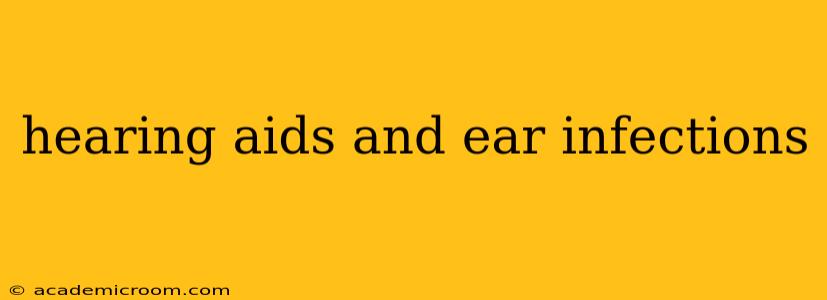Hearing aids can significantly improve the quality of life for millions, but concerns about ear infections often arise. This comprehensive guide explores the relationship between hearing aids and ear infections, offering valuable insights and addressing common questions. Understanding this connection is crucial for both hearing aid users and prospective users.
Can Hearing Aids Cause Ear Infections?
While hearing aids themselves don't directly cause ear infections, they can create an environment conducive to their development. The small, enclosed space created by a hearing aid within the ear canal can trap moisture and debris, potentially leading to bacterial or fungal growth. This is especially true for those prone to ear infections or who don't properly clean and maintain their devices. The risk is increased with certain types of hearing aids, such as those that sit completely inside the ear canal (completely-in-canal or CIC).
What are the Symptoms of an Ear Infection with a Hearing Aid?
Recognizing the symptoms of an ear infection is critical for prompt treatment. These can include:
- Pain or discomfort: A noticeable ache or throbbing in the ear is a common symptom.
- Itching: The infected area might feel intensely itchy.
- Discharge: Pus or other fluid may drain from the ear.
- Redness or swelling: The outer ear or the area around the ear canal might appear red and swollen.
- Hearing changes: While hearing loss is expected with hearing impairment, a sudden worsening of hearing, beyond what is typical for your hearing loss, could indicate an infection.
- Feeling of fullness: The ear may feel plugged or full.
- Fever: In some cases, a fever accompanies the ear infection.
It's crucial to note: If you experience any of these symptoms, consult an audiologist or doctor immediately. Do not attempt to self-treat.
How Can I Prevent Ear Infections While Wearing Hearing Aids?
Proactive measures are key to preventing ear infections associated with hearing aid use. These include:
- Regular cleaning: Clean your hearing aids daily as recommended by your audiologist or the manufacturer’s instructions. This typically involves wiping down the device with a dry or slightly damp cloth. Never use water directly.
- Drying the ear canal: After removing your hearing aids, gently dry your ear canals. You can use a soft, clean towel. Avoid using cotton swabs as they can push debris further into the ear canal. Consider using a dehumidifier for your hearing aids overnight.
- Proper handling: Handle your hearing aids carefully to avoid introducing bacteria or debris.
- Regular checkups: Schedule regular checkups with your audiologist to ensure your hearing aids are fitting correctly and to address any potential issues.
Are Certain Types of Hearing Aids More Prone to Causing Ear Infections?
While all hearing aids pose some risk, completely-in-canal (CIC) and in-the-canal (ITC) styles, which fit deeply within the ear canal, tend to have a slightly higher risk due to the increased moisture retention. However, proper cleaning and maintenance significantly mitigate this risk for all types of hearing aids.
What Should I Do If I Suspect an Ear Infection While Wearing a Hearing Aid?
Remove your hearing aid immediately if you suspect an ear infection. Then, contact your doctor or audiologist as soon as possible. They will be able to properly diagnose the infection and recommend appropriate treatment, such as ear drops or oral antibiotics. Do not attempt to treat the infection yourself.
How Does an Ear Infection Affect My Hearing Aid?
An ear infection can affect your hearing aid in a few ways. The infection itself may temporarily worsen your hearing loss. Also, discharge from the infection might damage the hearing aid's delicate components, requiring repair or replacement. Therefore, promptly addressing the infection is crucial to protect both your hearing and your hearing aid.
This information is for general knowledge and should not be considered medical advice. Always consult with a qualified healthcare professional for any health concerns or before making any decisions related to your health or treatment.
